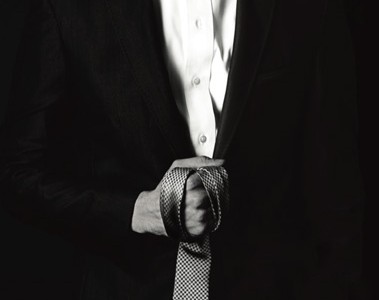Culture feature, Like magazine, February 2015. Click to enlarge. Read below.
Fit to be tied
With the movie adaptation set for release this month, Carolyn Moore wonders what we can expect from Fifty Shades of Grey – the infamous “mommy porn” book that made some women moan and others just want to scream.
Whatever way you want to look at it, Fifty Shades of Grey is nothing short of a literary phenomenon. With over 100 million books sold, it has broken records, astonished critics (not in a good way), and made its author, E.L James, a millionaire many times over.
Estimated to have earned in excess of €80 million from the trilogy – which famously started out as Twilight fan-fiction typed on a Blackberry – James now sits alongside J.K Rowling as one of the U.K’s wealthiest authors, and only Harry Potter has kept Fifty Shades from becoming the fastest selling book of all time. (Thank you Harry Potter, humanity owes you one.)
Because, as even its fans will acknowledge, the books are pretty awful. Between the excruciating inner monologue of the book’s female protagonist, Anastasia Steele (whose “inner goddess” is so frequently referred to that she’s practically a character herself), and the stilted, unnatural dialogue between the unlikely paramours, for many people, reading the book was more painful than anything the brooding Christian Grey could have imagined inflicting on the dreary Miss Steele.
“You are not just a pretty face, Miss Steel,” he tells her at one point. “You’ve had six orgasms so far and all of them belong to me.” And what girl’s “inner goddess” wouldn’t respond to a line like that by “dancing the merengue with some salsa moves”, “swaying in a gentle, victorious samba”, or “jumping up and down while clapping her hands like a 5-year-old” ?
Even the release of the trailer broke records, attracting over 100 million views in one week, so with tickets on sale since last year, it’s safe to assume that many of the women who have devoured the trilogy will already have a cinema date with Christian firmly marked in their calendars. The much-hyped film adaptation opens on Valentine’s Day, and the studios that won the fierce bidding war for the movie rights will be hoping it performs like Christian Grey on Viagra.
Starring Jamie Dornan and Dakota Johnson, artist-turned-director Sam Taylor-Johnson has been charged with bringing the work of erotic fiction to the big screen. Though it’s only her second feature film, she’s no stranger to exploring risqué topics in her short films, and according to producers Dana Brunetti and Michael De Luca, it’s Taylor-Johnson’s “unique ability to gracefully showcase complex relationships dealing with love, emotion, and sexual chemistry that make her the ideal director.”
Indeed, her involvement suggests that the filmmakers are seeking to produce that rare thing – a film that is better than the book. Not that it should prove difficult here, since for all its confounding yet record-breaking success, Fifty Shades of Grey was not exactly Booker Prize material.
Whether Taylor-Johnson has attempted to bring some much needed depth to the book’s catastrophic blend of implausible dialogue and shallowly drawn characters remains to be seen, but she has recently spoken of the pressures weighing on her, explaining: “I’m literally going out of my mind.
“I want to protect my vision and that’s the hardest thing. There are so many voices. You have to try and keep all those people at bay. You think, ‘you hired me because I’m a creative artist with a vision. Don’t try and knock it out of me.’
“I have seen this film over a thousand times,” she went on “but the nuances – the tiniest shift, look, blink of an eye, can make all the difference and flip it into the wrong territory. It’s like walking a knife’s edge.”
And with the book’s author, E.L. James, a constant presence on set, it’s easy to see where those creative tensions might have arisen. As anyone who has read it will know, subtlety and nuance were not chief among James’ concerns, and for many people the books don’t so much “flip into the wrong territory” as crash into it, like a train derailing and falling off a cliff.
Because therein lies the problem with Fifty Shades of Grey. There’s nothing “complex” about the relationship between Ana – who is naïve to the point of being almost an imbecile – and Christian – her wealthy, controlling stalker/boyfriend/boss. It’s a straightforward emotionally abusive relationship that seeks to hide its sinister undertones behind a façade of sexual exploration and a misunderstanding of the power dynamics inherent in BDSM.
Because while Grey also oversteps pre-agreed sexual boundaries in the book, for many readers it was the couple’s interactions outside the infamous “Red Room of Pain” that really raised eyebrows, as the 27-year-old billionaire businessman attempted to exercise control over every aspect of his insecure 21-year-old girlfriend’s life. If you think Patrick Bateman in American Psycho was perfect boyfriend material, then you’ll have no problem with Christian Grey being portrayed as some kind of romantic ideal, but I for one hope the film avoids normalising or romanticising this controlling behaviour.
“I’m incapable of leaving you alone,” we hear him tell her in the trailer. “Then don’t,” she replies, and that hope begins to wane, but Sam Taylor-Johnson – artist, mother of four girls, two time cancer survivor – sees it as the story of Anastasia’s “empowerment”, so she may yet come down on the right side of that “knife’s edge”. Dornan too, a self-described “Guardian-reading feminist”, has argued that “the film is not the book. It’s an adaptation, and Sam Taylor-Johnson is an artist as well as an award-winning film director. All I can say is, wait until you see it before passing judgment.”
So wait we must, and for those of us who relish any opportunity to watch women tell their stories, this film is Hollywood gold dust – a big budget, mainstream movie, written by and made by women, for women, with a female protagonist driving the narrative. So please, Fifty Shades, you can tie us up, but just don’t let us down.

